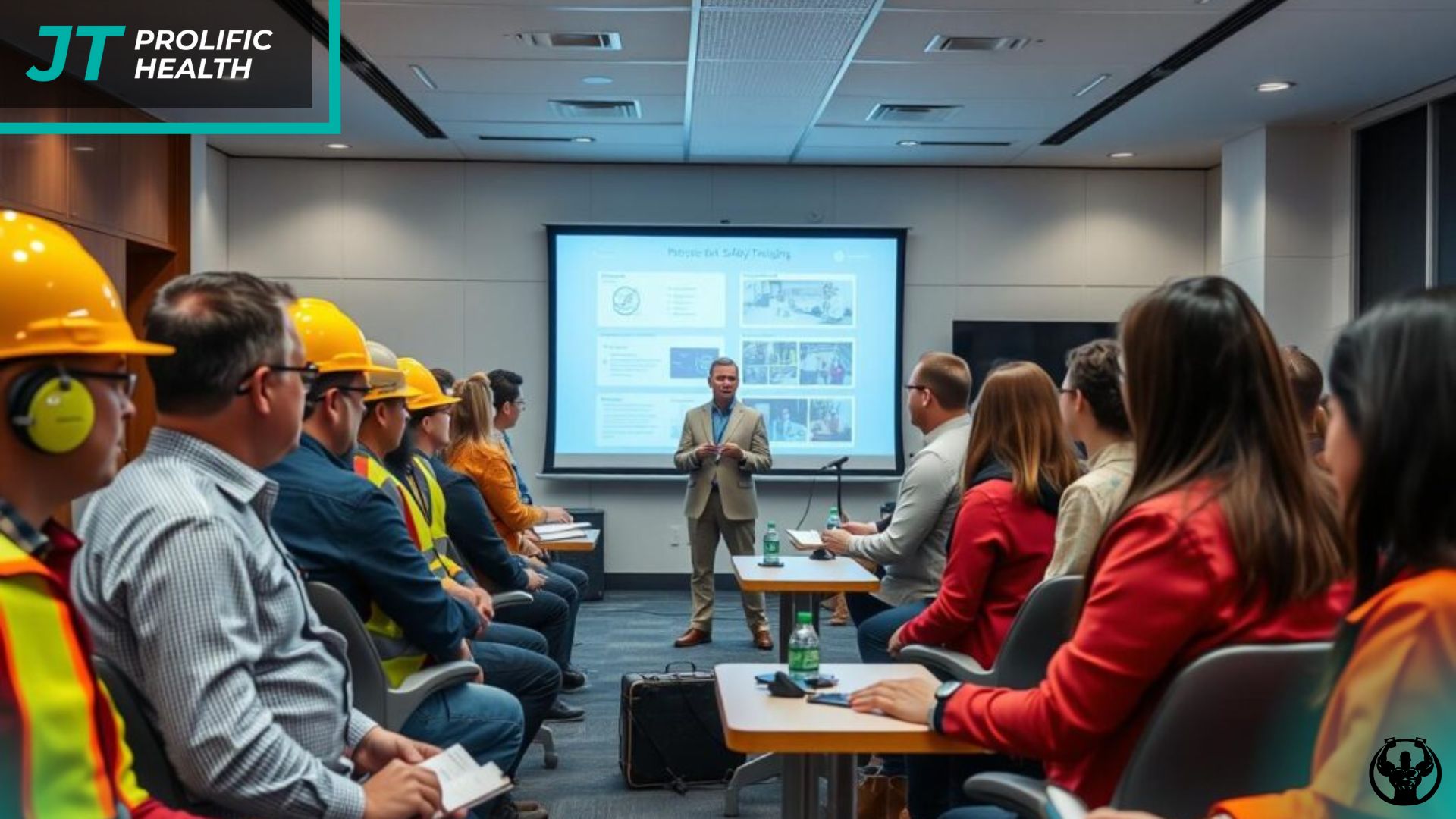Did you know 73% of certification seekers cite equipment costs as their top barrier to career advancement? At Prolific Health, we’ve redefined skill development by removing costly tools from the equation. Our Richmond-based programs prove you don’t need expensive gear to master industry-ready abilities.
Traditional methods often demand significant financial commitments for machinery or specialized tools. We’ve eliminated those hurdles through adaptive learning strategies that prioritize practical knowledge. Hands-on simulations and scenario-based exercises mirror real workplace challenges, ensuring you develop competencies employers value.
Safety remains central to every lesson. Our curriculum meets provincial standards while emphasizing risk mitigation techniques applicable across sectors. You’ll learn to assess environments, implement protocols, and respond to emergencies using everyday resources.
Career pathways become clearer when training aligns with local job market needs. Richmond’s growing industries—from healthcare to logistics—require adaptable professionals. Our certification process validates your expertise, giving you credibility with employers seeking proven talent.
Key Takeaways
- Develop job-ready abilities without equipment purchases
- Learn safety practices applicable across industries
- Gain certifications recognized by Richmond employers
- Access programs designed for diverse financial situations
- Prepare for real workplace scenarios through hands-on methods
Introduction to Equipment Free Training in Richmond
Local communities thrive when education adapts to their needs. At Prolific Health, we’ve built programs that reflect Richmond and Vancouver’s evolving workforce demands. Our dual-campus model connects learners with opportunities across the Lower Mainland region.


Our Commitment to Quality Training
Rigorous standards form the foundation of every course. Instructors with frontline experience teach techniques validated by industry leaders. You’ll gain knowledge that meets provincial safety regulations and employer expectations.
Program updates occur quarterly to align with sector trends. This ensures your education remains relevant in fast-paced fields like healthcare and logistics. We prioritize practical application through scenario-based learning modules.
Overview of Our Local Presence
With locations in Richmond and Vancouver, we serve diverse communities effectively. Strong partnerships with WorkBC and municipal agencies help shape curriculum development. These connections provide insights into emerging job opportunities.
Our team understands regional challenges, from housing costs to transportation needs. Flexible scheduling and adaptive teaching methods make career development accessible. Contact us at 604 818 6123 to explore services tailored to your goals.
Understanding the Benefits of Equipment Free Training
Breaking down barriers to professional growth starts with reimagining how core competencies are taught. Our methodology prioritizes adaptable learning strategies that mirror workplace demands while removing unnecessary expenses.


Enhanced Skill Development and Practical Learning
Interactive simulations replace traditional machinery dependence. You build technical expertise through scenario-based exercises that test decision-making under pressure. This approach strengthens critical thinking abilities applicable to multiple systems and environments.
Rather than memorizing button sequences, you master operational principles. Problem-solving drills prepare you for unexpected challenges employers face daily. These methods foster transferable knowledge that adapts as technology evolves.
Cost-Efficiency and Accessibility
Financial constraints shouldn’t block career advancement. Our programs cut expenses linked to specialized tools, letting you focus resources on growth. No rental fees or purchases mean more learners can participate.
Flexible delivery options accommodate diverse schedules and locations. Whether balancing work or family commitments, you access the same quality education. This model creates pathways for underrepresented groups to enter high-demand fields.
Local Government Support and Community Initiatives
British Columbia’s workforce development strategy thrives when public and private sectors collaborate. Provincial investments in skill-building programs create pathways for residents to enter growing fields while addressing critical safety needs. These efforts reflect a shared vision for safer neighborhoods and stronger local economies.


Training Projects Funded by the Province
A recent $200,000 provincial initiative supports aspiring fire-protection technicians across the Lower Mainland. Participants complete 11 weeks of classroom instruction covering system inspections, emergency light maintenance, and hazard assessment protocols. Four weeks of paid work experience with regional employers bridges theory with practice.
This fully funded program removes cost barriers through government backing. Graduates receive job placement assistance and one week of career coaching. Such projects demonstrate how public funding translates into qualified professionals ready to protect homes and businesses.
Community Partnerships Strengthening Safety
Collaborations with organizations like YMCA BC ensure training aligns with employer demands. Local companies actively participate in curriculum design, guaranteeing you learn skills that match current industry standards. These alliances create direct hiring pipelines for graduates.
Joint efforts between educators, employers, and municipalities raise safety benchmarks region-wide. You gain expertise valued across multiple sectors while contributing to community resilience. This model proves effective skill development requires teamwork beyond classroom walls.
Public Safety and Fire-Protection Training Programs
Communities grow stronger when skilled professionals maintain vital defense mechanisms against disasters. Our fire-protection courses equip you with expertise to inspect and service life-saving infrastructure. These programs blend technical knowledge with hands-on practice, creating technicians ready to safeguard residential and commercial spaces.
Mastering Fire-System Fundamentals
You’ll learn to assess sprinkler networks, emergency lighting, and alarm components through realistic simulations. Industry-specific terminology becomes second nature, ensuring clear communication during inspections. Detailed modules cover:
- Diagnostic procedures for extinguishers and special hazard equipment
- Maintenance protocols preventing system failures
- Regulatory standards for different building types
Building Bridges With Safety Experts
Local fire departments contribute to our curriculum design, keeping content aligned with current threats. Joint exercises with emergency responders let you practice coordinated crisis responses. This partnership model ensures your skills meet municipal safety objectives.
Graduates leave prepared to conduct thorough evaluations that prevent catastrophic losses. Your work will directly contribute to neighborhood resilience while building a stable career in high-demand sectors.
Maritime and Marine Training Opportunities
Canada’s coastline spans three oceans, creating demand for skilled professionals who keep waterways safe. Our programs prepare you for careers in coastal operations, cargo shipping, and marine emergency response. Learn through methods approved by Transport Canada while meeting federal requirements for maritime personnel.
Standards Set by Transport Canada
Transport Canada establishes strict guidelines for crew competency across all vessel types. Courses align with Marine Personnel Regulations, covering everything from basic survival skills to advanced navigation systems. You’ll master protocols recognized by employers nationwide, ensuring your qualifications remain valid throughout your career.
Marine Safety and Certification Insights
Gain expertise in fire suppression, emergency first aid, and evacuation procedures through hands-on simulations. Certification pathways include:
- STCW Basic Safety for entry-level roles
- Advanced Fire Fighting techniques
- Radar operation and electronic chart systems
These programs combine classroom theory with practical drills mirroring real maritime challenges. Graduates qualify for positions ranging from deckhands to safety officers, backed by credentials accepted in ports worldwide.
Exploring what equipment free training options richmond
Career growth shouldn’t be limited by access to tools. Programs without specialized machinery open doors across industries through creative teaching approaches. Learners develop expertise using scenario-based simulations that mirror workplace challenges.
Multiple Industries, One Approach
Our methods prepare professionals for sectors needing practical problem-solvers. Choose pathways aligned with regional employer demands:
- Emergency response protocol development
- Coastal operations safety standards
- Infrastructure inspection techniques
- Technical system diagnostics
These programs focus on decision-making skills rather than equipment operation. You gain knowledge applicable to various roles through adaptable learning modules.
Proven Outcomes in the Workforce
Local case studies reveal tangible results. Recent graduates secured positions in healthcare facilities and shipping terminals within six weeks of certification. One learner transitioned from retail management to municipal safety inspections through our fire-protection course.
Employers consistently report high satisfaction with hands-on competencies demonstrated by alumni. This track record shows how theoretical foundations translate into workplace readiness without costly tool dependencies.
Innovative Strategies for Skills Development
Modern workforce demands require fresh approaches to building professional capabilities. Education leaders now prioritize methods that bridge knowledge gaps while preparing learners for actual workplace challenges. These strategies combine cognitive understanding with tangible application.
Modern Techniques in Practical Training
Interactive simulations form the backbone of contemporary instruction. You engage with scenarios mirroring real operational environments, from emergency response drills to system diagnostics. This method builds muscle memory for critical tasks without physical equipment.
Adaptive learning modules adjust to your progress, reinforcing weak areas through targeted exercises. Visual, auditory, and kinesthetic activities cater to diverse learning preferences. Research-backed methods ensure retention rates exceed traditional lecture-based models.
Blending Classroom Theory with Real-World Experience
Conceptual knowledge gains meaning through applied practice. You analyze case studies from active worksites, then develop solutions using industry-standard protocols. Instructors challenge you to defend decisions, sharpening problem-solving abilities.
Collaborative projects simulate team-based workplace dynamics. These exercises teach communication strategies while testing technical competencies. Graduates consistently report feeling prepared for their first day on the job.
Local Education and Employer Partnerships
Building career pathways requires teamwork between educators and industry leaders. Prolific Health bridges this gap through strategic alliances that turn classroom knowledge into workplace success. Our collaborations with colleges, employers, and community organizations create seamless transitions from certification to employment.
Collaborations With Community Leaders
Regional workforce needs guide every program update. We meet monthly with business owners and municipal advisors to identify skill shortages. This feedback shapes curriculum development, ensuring you learn techniques local companies value most.
Key benefits of these partnerships include:
- Direct hiring pipelines with major employers
- Workshops led by active industry professionals
- Site visits to leading Richmond and Vancouver businesses
WorkBC and Other Initiatives
Government programs amplify career opportunities across British Columbia. Through WorkBC’s Community and Employer Partnerships (CEP), you access funded training projects aligned with provincial priorities. The StrongerBC Future Ready Plan supports this mission by removing financial barriers to skill development.
Our participants gain exclusive advantages:
- Free career coaching sessions
- Job placement assistance with partner organizations
- Priority enrollment in high-demand programs
Contact us to explore initiatives matching your professional goals. Together, we’re building a workforce ready for tomorrow’s challenges.
Comprehensive Training Services in Richmond and Vancouver
Regional workforce demands shape our multi-sector solutions. Prolific Health delivers accessible pathways through coordinated programs across the Lower Mainland. Our approach connects you with certifications recognized by employers in growing industries.
Our Service Directory Overview
Explore career-building resources designed for varied professional needs. The directory includes:
- Safety protocols for industrial and healthcare settings
- Marine operation standards meeting federal requirements
- Fire-system inspection techniques used by municipal teams
- Technical diagnostics for infrastructure maintenance
Facilities in Richmond and Vancouver offer hands-on simulations mirroring real workplace challenges. Programs adapt to different experience levels, whether you’re starting fresh or upgrading skills. Flexible scheduling options include evening classes and weekend workshops.
Corporate partners access tailored solutions for team development. Individuals benefit from blended learning models combining online coaching modules with in-person practice. This integrated system lets you stack certifications while maintaining work-life balance.
Career advisors help navigate the directory based on your goals. They match your aspirations with courses having direct hiring pathways. Continuous updates ensure content reflects current industry standards across all sectors.
Ensuring Safety and Emergency Preparedness
Protecting lives starts with proper preparation. Our programs build expertise through methods validated by industry leaders and municipal partners. You develop competencies that prevent accidents before they occur.
Standards in Fire and Emergency Training
Fire safety protocols become second nature through realistic simulations. You practice evacuations, equipment inspections, and hazard containment using scenario-based drills. These methods meet provincial standards while adapting to evolving workplace risks.
Health and Safety Regulations
Understanding legal frameworks ensures compliance across industries. You learn to implement protocols governing ventilation systems, hazardous materials, and emergency exits. This knowledge helps maintain environments where teams thrive.
Graduates leave ready to address crises calmly and effectively. Your skills will safeguard communities while advancing career opportunities in high-demand fields. Safety isn’t just a protocol – it’s a professional mindset.




